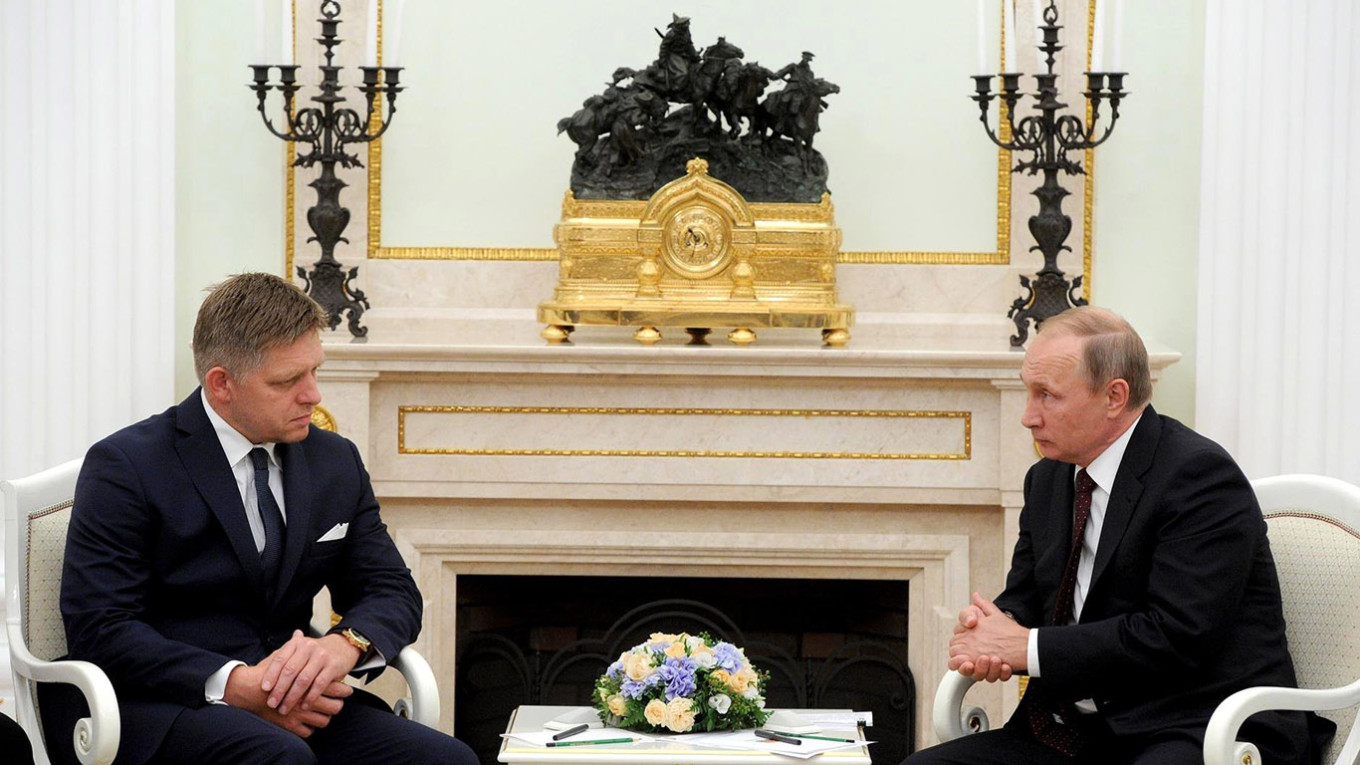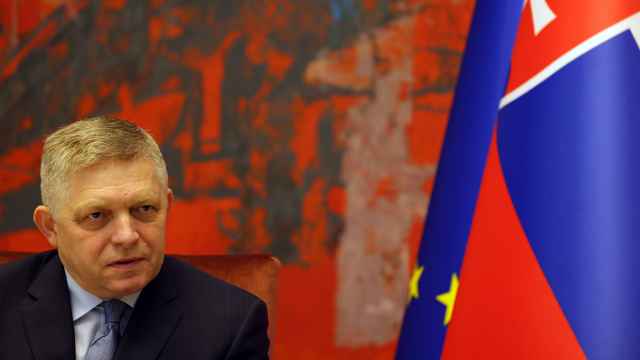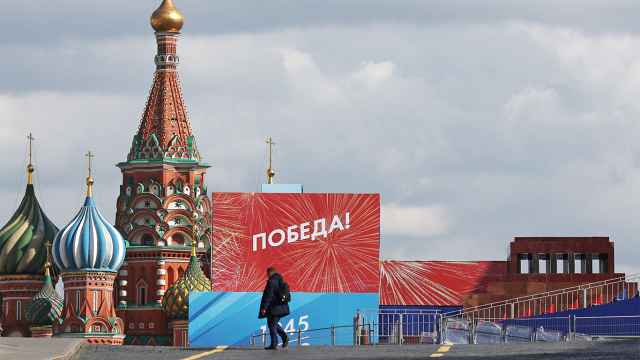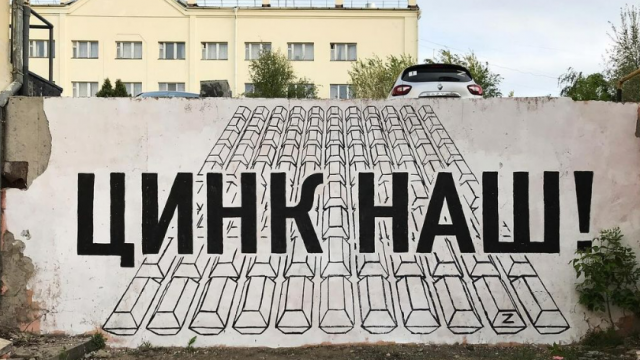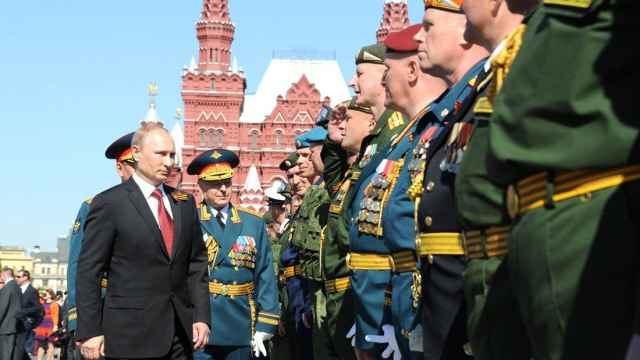Two weeks ago, Slovakia’s Prime Minister, Robert Fico, confirmed officially that he was planning to join President Vladimir Putin in Moscow for the 80th anniversary of the end of World War II in May next year. The announcement followed Fico’s earlier musings during his surprise appearance on Olga Skabeyeva’s show on Rossiya 1 — a first by an EU leader in the recent past, if not in the entire history of the program. He told Skabeyeva, who is sanctioned by the United States, the EU and Britain, that he saw participating in next year’s ceremonies as his “personal duty,” and suggested that Russia was effectively invincible. If Russia ever appears on its knees, he said, it is because they are “tying their shoelaces.”
Whatever Fico’s flaws – and there are many – he displays a striking consistency in his foreign policy outlook. There can be no doubt that the views that he expressed were sincere and long-held. In contrast, Hungary’s Viktor Orbán, to whom Fico is frequently compared, was a staunch Atlanticist in the 1990s and much of the 2000s. When responding to Putin’s invasion of Georgia in the summer of 2008, for example, there was little daylight between Orbán and Russia hawks from Tallinn to Warsaw.
No similar shift can be detected in Fico’s. Already in 2014, Slovakia’s Prime Minister was among the earliest critics of sanctions against Russia, which he maintained were “non-sensical” and “ineffective.” Throughout his career, Fico has been more than happy to cater to the latent anti-American undercurrent in Slovak public opinion, picking on NATO’s 1999 bombing campaign against Milosevic’s regime in Yugoslavia or the Iraq War, both of which he lambasted as acts of imperial hubris.
To understand Fico, it is worth acknowledging that, unlike Orbán, who fancies himself a global mover and shaker, sitting as an equal at the negotiating table with Trump, Xi, and Putin, Slovakia’s Prime Minister is a thoroughly parochial actor for whom, subtler considerations of international politics come as a distant overthought. To be sure, he is a successful and effective politician – but he lacks Orbán’s ambition and his ideological agenda, aimed at remaking the political map of the Western world.
Fico’s formative experience, which informs his foreign policy views, is one of upward social mobility afforded to ambitious apparatchiks from the Slovak part of then-communist Czechoslovakia in the era known as “normalization”, which followed the Soviet invasion of the country in 1968. A young lawyer and a reliable party member, Fico had good reasons to believe his best days were still ahead of him, thanks to the communist political system.
In the 1990s, he transitioned seamlessly into the new system as a young member of parliament for the formerly communist, now reformed left-wing party. In addition to his academic work on the death penalty, his early political comments involved a defense of the social acquis of the communist era, such as scholarships, which had once helped him get to university and kickstart his promising career.
The nostalgia was tempered, at least initially, by a sense of pragmatism. When he founded his own political party Smer, (meaning “Direction” in Slovak) he sought to model its platform after the successful examples of third-way, left-of-center politics seen in Britain and the United States. Besides corruption, he zoomed in on the social costs of the transition from communism, criticizing the ‘neoliberal’ reforms required of new EU member states but mostly steering clear of rank euroskepticism.
As he solidified his position as the leader of the largest catchall political party in the country, Fico would end up governing a kleptocratic pyramid, with himself at the top and with a governing agenda that has grown increasingly thin. Today, Slovakia has slipped behind Romania in its per-capita GDP, expressed in purchasing power parity terms — hardly a flattering legacy for a leader who served as Slovakia’s prime minister at various times for over 11 years in the past two decades.
Throughout his time in politics, Fico’s rhetoric has hardened continually, typically in response to outside events — such as Europe’s refugee crisis of 2015 — and domestic shocks. When he was pressured to resign in the spring of 2018 after the murder of Ján Kuciak and his fiancée, Martina Kušnírová, Fico blamed the US embassy for trying to instigate a “color revolution” in Bratislava. When he returned to power in October last year, it was universally acknowledged that the new version of Fico was more ruthless and less inhibited than the calculating pragmatist of the past. The experience of surviving an assassination attempt in the spring of this year surely has driven home the urgency of making the most out of his time in office.
That has included giving Slovakia’s foreign minister, Juraj Blanár, a green light to deepen the country’s relationship with Russia. This year alone, Blanár met with Russia’s Sergey Lavrov three times: in March in Antalya, on the margins of the UN General Assembly Meeting in New York in September, and at the OSCE meeting in Malta last week. The ministry staff and the rest of the Slovak delegation had been kept in the dark about the UN meeting until the last moment.
In all three cases, Slovakia’s government refused to elaborate on the content of the talks, letting Russian propaganda use all three opportunities to advance its own narrative. Following the meeting in Malta, Russians have claimed that Slovakia, alongside Hungary, has enthusiastically embraced Russian plans for a “Eurasian security architecture.” Notwithstanding meek protests from Slovakia’s foreign ministry against a Russian readout of the meeting, there are signs that Slovakia’s pro-Moscow turn is not just rhetorical. Blanár, for example, has been purging Atlanticist and pro-European voices from the ministry, replacing them with large numbers of MGIMO graduates.
Mirroring Orbán’s embrace of China, Fico also visited Beijing in early November. The trip, strangely, excluded Slovak journalists from participating, instead giving away seats on the government airplane to well-connected businesspeople. Just what deals were struck in China is unclear. What is known, however, is that Slovakia’s relationship with China has now been upgraded to the level of a ‘strategic partnership’.
Unlike Orbán, Fico is neither an original thinker nor a particularly deep one. His overwhelming interest is to preserve his coalition’s grip on power and on economic resources at home. While he might be distrustful of the West – particularly the United States – he will not start a crusade to take Slovakia out of NATO or the EU. However, the behavior of the likes of Orbán, Ivanishvili and now Trump will continue to shape his own sense of what is permissible in cementing his hold on power. Whatever may have come out of Bratislava, both in terms of shocking foreign policy rhetoric and in terms of the nation’s democratic decline, odds are that we have not seen the bottom yet.
A Message from The Moscow Times:
Dear readers,
We are facing unprecedented challenges. Russia's Prosecutor General's Office has designated The Moscow Times as an "undesirable" organization, criminalizing our work and putting our staff at risk of prosecution. This follows our earlier unjust labeling as a "foreign agent."
These actions are direct attempts to silence independent journalism in Russia. The authorities claim our work "discredits the decisions of the Russian leadership." We see things differently: we strive to provide accurate, unbiased reporting on Russia.
We, the journalists of The Moscow Times, refuse to be silenced. But to continue our work, we need your help.
Your support, no matter how small, makes a world of difference. If you can, please support us monthly starting from just $2. It's quick to set up, and every contribution makes a significant impact.
By supporting The Moscow Times, you're defending open, independent journalism in the face of repression. Thank you for standing with us.
Remind me later.



